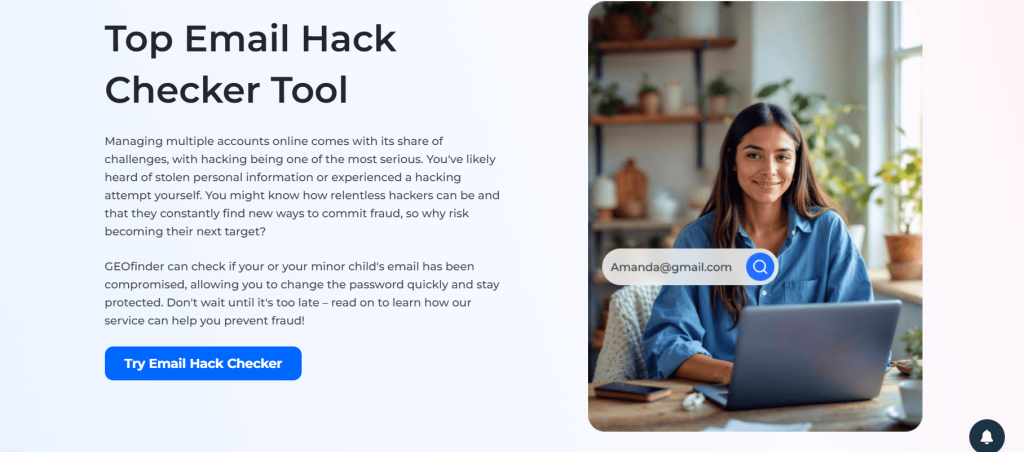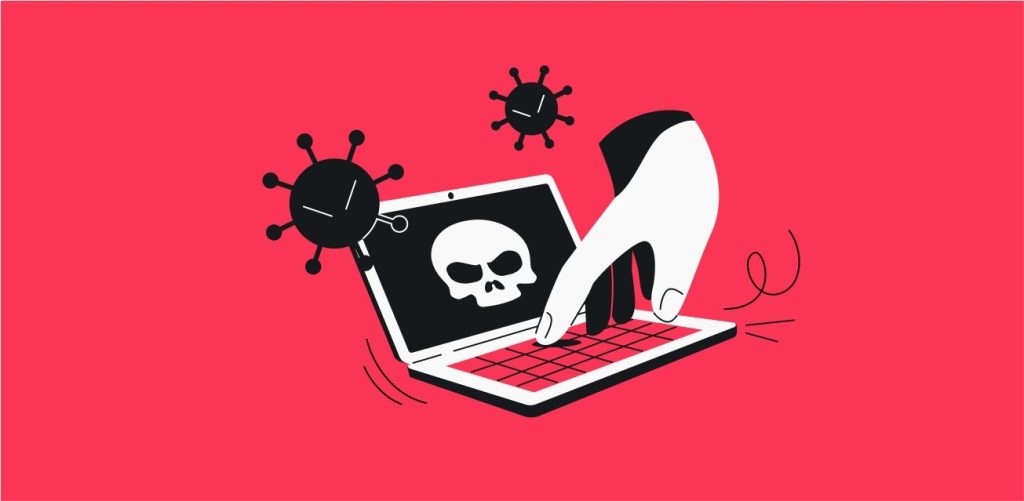We use our emails every day for basically everything – logging into Google-like accounts, when we can’t be bothered to create a new profile, actually creating a new profile on a site we saw for the first time ever, signing up for random newsletters – the list goes on. Sometimes, this behaviour can result in your email being hacked or stolen. So, how can you see it coming from miles away?
In this article, we’ll give you 7 warning signs of an email hack to watch out for if you suspect something is wrong, and we’ll suggest a great email hack checker to make life easier. Read on!
Pro Tip: Try GEOfinder to Protect Your Email

We all know how essential our email is. It’s where everything lives: banking info, work-related things, even those receipts you’re probably ignoring. If someone hacks your email, they’ve got access to all of it. But, wouldn’t it be nice to get a heads-up before it goes downhill?
That’s where GEOfinder shines. It’s an online email leak checker that checks your email for signs of hacking, catching any signs of trouble so you can fix it before it gets out of hand:
- Catch hacks early: If someone’s been snooping around or has already gotten into your email, you’ll know right away with this email leak checker. That way, you can change your password and stop them from going further.
- Look out for red flags: If you’re getting random password reset requests or just feel like something’s off, GEOfinder’s email security check can flag that for you. No more waiting for the shoe to drop.
- Keep your stuff safe: GEOfinder’s email security check only asks for your email, not for passwords or personal info. So you’re not sharing anything you don’t want to.
Breakdown of Signs of an Email Hack
Noticed something off in your inbox? Maybe messages you didn’t send or login alerts from places you’ve never been? Here are the warning signs your email might have been compromised:
Unfamiliar Logins or Devices
Imagine you get an email that says “New login from a device in Australia”, and unless you’re on vacation in Sydney, that’s… not great.
Most email services, like Gmail or Outlook, will let you know when there’s a login from a new location or device. If you’re seeing alerts about places you’ve never been (or devices you don’t own), there’s a good chance someone else is snooping around in your inbox. And if someone’s managed to log into your email, they’re not just poking around for fun. They can:
- Read your personal messages
- Reset your passwords on other accounts (think: Instagram, PayPal, Netflix)
- Spam your friends or even scam them
Password Suddenly Doesn’t Work
You go to check your email like usual – nothing weird, just your normal morning routine – and all of a sudden, your password doesn’t work. You type it again, slower this time, just in case your fingers are being weird. Still wrong. Cue the mild panic.
If you know you didn’t change your password, and there’s no reason it should be different, that’s a major red flag. It probably means someone else did, and not someone you gave it to. If someone else changed your password, they’ve basically taken over. At that point, they can:
- Reset passwords for your other accounts (because everything’s connected to your email)
- Steal your personal info
- Send out scammy messages pretending to be you
Emails Sent That You Didn’t Write
Nothing will make your stomach drop faster than getting a text from a friend saying, “Uh, why did you send me this weird link?” You open your email, check your Sent folder, and there it is: a message you definitely didn’t write… and it was sent to everyone.
If this happens, it’s almost certain that someone has accessed your account. And when hackers start sending things from your email, it’s not just embarrassing – it can get ugly fast. They’re usually trying to:
- Trick your friends or colleagues into clicking phishing links
- Spread viruses or malware
- Use your good reputation to scam people
And because it’s coming from your real email, people are way more likely to trust it.
Missing or Deleted Emails
You know that feeling when you open your inbox and something just feels… wrong? Maybe an email you swear you had is gone. Maybe a whole conversation thread has disappeared. It’s not just you being forgetful: if stuff is missing, it could mean someone’s been inside your account, trying to clean up their mess.
Hackers love to cover their tracks. Deleting emails is one of the first things they do when they get in. If messages are disappearing, it usually means whoever got into your account was trying to:
- Hide the fact that they requested password resets on your other accounts
- Erase warning emails from your provider
- Get rid of evidence that they sent shady emails from your address
Unexpected Password Reset Requests

You’re halfway through a coffee or stuck in traffic, and suddenly your phone pings: “Reset your Netflix password!” Weird, because you were literally just watching Breaking Bad without a problem. Then five minutes later, it’s your PayPal. Then Facebook.
Now it’s feeling less random and a lot more like someone’s trying to break in.
When random password reset emails start rolling in, it usually means someone has your email address and is trying to guess your other account passwords. Hackers aren’t just guessing your Netflix password for fun. They’re trying to force their way into anything tied to your email – your money, your shopping accounts, your social media. And if they manage to change the password on one of them before you notice, it’s game over.
Security Alerts from Your Provider
You’re waiting in line for coffee, half-asleep, when your phone buzzes:
“New sign-in detected from Windows – Sydney, Australia”.
Pretty sure you didn’t book a flight to Sydney last night.
When your email provider sends you one of those security alerts, it’s not just being dramatic. It means someone actually tried (or succeeded) in getting into your account, and they’re not planning to stop at just reading your inbox. Hackers aren’t just curious about your emails. Once they’re inside, they can:
- Reset your bank logins
- Grab personal info buried in old emails (like your address or credit card confirmations)
- Set up invisible forwarding rules to spy on you for weeks without you knowing
You Can’t Access Linked Accounts
You’re trying to log into Amazon to check on a package, but you get “Incorrect password”. You think, “Okay, maybe I messed up, no big deal”. So you reset it. Then you go to check Netflix, and bam, same deal. Then Instagram.
Now you’re starting to freak out. This isn’t just a glitch. Someone’s been in your email and locked you out of everything connected to it.
When someone takes over your email, they’re not just looking for your Netflix password. They’re trying to reset everything else: your bank account, your shopping sites, maybe even your social media. They can:
- Get into your bank and wipe out your savings (seriously, they can do that)
- Use your social media to impersonate you and scam your friends
- Shop on your dime like they’re living large in your name
Conclusion
If any of these warning signs are hitting a little too close to home, don’t just hope it’ll blow over. Hackers are crafty and get hold of your info without you even knowing. The longer you wait, the worse it can get – and trust us, you don’t want to find yourself locked out of everything with a hacker going wild in your accounts.
That’s exactly why you should give GEOfinder a try. It helps you catch any weird things happening with your email before it turns into a full-blown disaster. Instead of scrambling after the fact, you can stay ahead of the hackers and lock things down before they get out of hand.

Oliver Smith is an experienced blogger at Grammar Globe, Oliver Smith, an expert in English grammar and a master of wit, brings language to life with his playful take on puns. Through his works, he weaves humor into the rules of grammar, making learning fun and engaging for readers of all ages. Discover language with a smile!”







